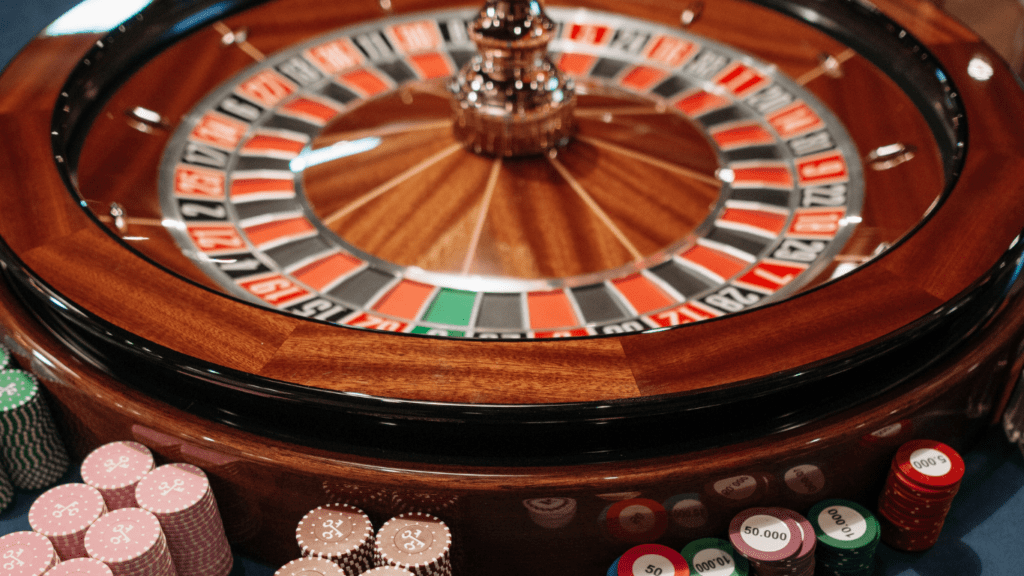Understanding Casino Games
Casino games vary greatly in rules, strategies, and odds. Each game offers unique experiences and chances to win, making it crucial to understand their fundamentals before diving in. Below, I’ll break down some of the most popular types of casino games.
Slot Machines
Slot machines are among the simplest casino games. Players insert money, press a button or pull a lever, and wait to see if the symbols align to win a prize. They’re purely luck-based, requiring no skill. Modern slot machines often feature bonus rounds and progressive jackpots, adding to the excitement.
Blackjack
Blackjack is a card game where players aim to have a hand value as close to 21 as possible without exceeding it. Each player competes against the dealer. Understanding basic strategies like when to hit or stand can improve chances. For example, if a player holds a hand value of 16 while the dealer shows a 10, it’s typically best to draw another card.
Roulette
Roulette involves betting on a single number, groupings of numbers, or colors on a spinning wheel. The croupier spins the wheel in one direction and rolls a ball in the opposite direction. When the ball lands on a pocket, winners are those who bet on the correct outcome. It’s a game of chance but understanding betting strategies can be beneficial.
Poker
Poker differs from most casino games because it involves skill. Players make bets based on the strength of their cards and their ability to bluff opponents. There are several variations, but the most common in casinos is Texas Hold’em. Developing a solid understanding of poker hands and betting strategies is essential for success.
Craps
Craps is a dice game where players bet on the outcomes of a roll, or series of rolls, of two dice. The game might seem complicated due to the various betting options, like Pass Line or Don’t Pass bets, but it becomes more accessible with practice. Learning the basic bets can make the game more enjoyable and strategic.
Baccarat
Baccarat is a card game where players choose to bet on the player’s hand, banker’s hand, or a tie. The objective is to have a hand value closest to nine. It’s a simple game, often favored by high rollers, because of its low house edge. Understanding the drawing rules can help in making informed bets.
Video Poker
Video poker combines elements of slot machines and poker. The objective is to get the best hand possible. It differs from regular slots because it requires making decisions, such as which cards to hold or discard. Familiarity with poker hand rankings and basic strategies can positively impact results.
Understanding these popular casino games can enhance the overall gaming experience and provide better chances to win. It’s essential to recognize that each game comes with its own set of rules and strategies. Therefore, taking the time to familiarize oneself with these aspects can make for a more enjoyable visit to the casino.
Slot Machines
Slot machines offer a straightforward yet exciting gaming experience. They are ideal for beginners who want to try their luck without complex strategies.
How They Work
Slot machines operate on a simple principle. Players insert coins, tokens, or digital credits, then spin the reels by pulling a lever or pressing a button. The goal is to match symbols along paylines to win prizes. Modern slot machines use random number generators (RNGs) to determine the outcome of each spin, ensuring fairness and unpredictability.
Types of Slot Machines
There are several types of slot machines, each with unique features:
- Classic Slots
Classic slots have three reels and fewer paylines. They’re easy to understand, making them perfect for newcomers. - Video Slots
Video slots feature five or more reels and numerous paylines. They often include bonus rounds and special symbols, like wilds and scatters, which enhance the gaming experience. - Progressive Slots
Progressive slots are linked across multiple machines or casinos. A portion of each bet goes into a jackpot, which grows until someone wins. The allure of life-changing jackpots makes these machines extremely popular. - 3D Slots
3D slots offer immersive graphics and sound effects. They provide an engaging experience with intricate storylines and animated characters.
- Start with Free Games
Before betting real money, try free versions of slot machines. This helps you understand the mechanics without financial risk. - Set a Budget
Determine a budget and stick to it. Slots can be fast-paced, and it’s easy to lose track of spending. - Understand Paylines and Payouts
Check the machine’s paytable to learn about paylines, symbols, and potential payouts. Knowing what to expect can significantly enhance your gaming experience. - Play Maximum Paylines
Whenever possible, activate the maximum number of paylines. This increases your chances of winning, although it might require a higher bet. - Take Breaks
Regular breaks help you stay focused and prevent fatigue. It’s easier to make mindful decisions when you’re refreshed.
Blackjack
Blackjack stands out as one of the most popular casino games worldwide. Its simplicity attracts beginners, while its depth in strategy appeals to seasoned players.
Basic Rules
In Blackjack, the goal is to have a hand value higher than the dealer’s without exceeding 21. Each player receives two cards, and the dealer receives one card face up and one face down. Cards 2 through 10 are worth their face value, face cards are worth 10, and aces can be worth 1 or 11. Players can hit (take another card) or stand (keep their current cards) to reach as close to 21 as possible.
Strategies for New Players
- Understanding Basic Strategy: Learn the basic strategy chart, which shows the optimal move for every possible hand. This reduces the house edge significantly.
- Managing Bankroll: Set a clear budget before playing and stick to it. This helps manage losses and avoid overspending.
- Avoid Side Bets: For beginners, skip side bets like insurance or perfect pairs, as they generally have a higher house edge.
- Ignoring Dealer’s Upcard: Always consider the dealer’s upcard when deciding to hit, stand, or double down. For instance, if the dealer shows a 2 through 6, they are more likely to bust, so it’s often better to stand on lower totals.
- Not Splitting or Doubling Down Appropriately: Know when to split or double down. For example, always split aces and eights, and double down when you have 11.
- Chasing Losses: Avoid increasing bets in an attempt to recover losses. Stick to your initial strategy and budget.
Blackjack requires understanding both the basic rules and appropriate strategies to increase your chances of winning. By avoiding common mistakes, you can enhance your overall gaming experience.
Roulette

Roulette, a classic casino game, is known worldwide for its simple rules and exciting gameplay. Players try to predict where the ball will land on the spinning wheel.
How to Play
Place your bets on the table to start playing Roulette. The dealer, called a croupier, then spins the wheel in one direction and the ball in the opposite. Once the ball lands in a numbered pocket, the winning bets are determined. Bet on various options, including single numbers or groups of numbers.
Types of Bets
Roulette offers several betting options:
- Inside Bets: Bets placed on specific numbers or small groups of numbers. For example, a straight-up bet directly on one number or a split bet on two adjacent numbers.
- Outside Bets: Bets placed on larger groups of numbers or specific categories. For example, red/black, odd/even, or high/low.
- Announced Bets: Special bets typically found in European roulette. These bets cover specific sections of the wheel like “Voisins du Zero” or “Orphelins.”
Winning Strategies
Employing strategies can enhance the Roulette experience:
- Martingale System: Double your bet after each loss to recover previous losses when you win. Suitable for even-money bets.
- Fibonacci System: Increase bets following the Fibonacci sequence after a loss. This strategy focuses on minimizing risks.
- D’Alembert System: Increase bets by one unit after a loss and decrease by one unit after a win. This system aims to balance wins and losses without excessive risk.
Understanding Roulette’s betting options and strategies helps in making informed decisions, improving the overall gaming experience.
Poker
Poker is one of the most popular and skill-based casino games. This game combines strategy and luck, making it appealing to both beginners and experienced players.
Overview of Poker Variants
Various poker variants exist, each offering unique gameplay. Key types include:
- Texas Hold’em: Most widely played, each player receives two private cards, and five community cards are dealt face-up.
- Omaha: Similar to Texas Hold’em but players receive four private cards and must use exactly two of them along with three community cards.
- Seven Card Stud: Players receive seven cards, three face-down and four face-up, causing more hidden information.
- Five Card Draw: Each player gets five private cards and can exchange a number of these cards to improve their hand.
- Razz: A lowball game where the lowest hand wins, with players receiving seven cards.
Basic Poker Rules
While each variant has specific rules, some fundamental concepts remain consistent:
- Hand Rankings: Understand the hierarchy from high card to royal flush.
- Betting Rounds: Progress through stages like pre-flop, flop, turn, and river, each involving betting.
- Bluffing: Use deceptive strategies to convince opponents your hand is better than it actually is.
- Showdown: Reveal cards at the end of the final betting round to determine the winner.
For instance, in Texas Hold’em, begin with two private cards, then proceed through four betting rounds with shared community cards.
Tips to Improve Your Game
Improving your poker game involves strategy and practice:
- Position Awareness: Act later in the betting rounds to gain information on opponents’ moves.
- Hand Selection: Play strong hands more aggressively and fold weaker ones.
- Bankroll Management: Control your spending to avoid significant losses.
- Reading Opponents: Observe betting patterns, timing, and behavior to gauge hand strength.
- Practice: Play regularly to refine skills and strategies.
Incorporate these tips to enhance your poker experience and increase the likelihood of winning hands.
Baccarat
Baccarat, popular among high rollers, offers straightforward gameplay with simple rules and various betting options, making it suitable for beginners and veterans alike.
Game Rules
Baccarat involves betting on one of three possible outcomes: the Player’s hand winning, the Banker’s hand winning, or a Tie. Each hand gets two cards dealt, with a third card drawn in specific situations. The hand value closest to nine wins. Cards two through nine have their face values, Aces count as one, and 10s plus face cards count as zero. The total value of a hand is the rightmost digit of the sum of the card values. For instance, a hand with a 7 and an 8 totals 15, which counts as 5.
Betting Options
Players can bet on the Player, Banker, or Tie. Betting on the Banker has a slightly lower house edge, typically around 1.06%, but involves a 5% commission on winning Banker bets. The Player bet has a slightly higher house edge, usually 1.24%, but with no commission. Betting on a Tie has the highest house edge at approximately 14.36%, though it offers a higher payout, often 8:1 or 9:1.
Beginner Tips
Beginners should start with the Banker bet due to its lower house edge. Avoid the Tie bet because of its high house edge. Manage your bankroll effectively. Set betting limits and stick to them. Keep track of the results but remember past outcomes don’t affect future results. Practice playing free versions of Baccarat to get comfortable with the rules and betting options before wagering real money.
Understanding the rules, betting options, and effective strategies can enhance one’s experience and increase winning chances in Baccarat, even for beginners.


 Dorothya Silvannan, the visionary founder of Hype Gamble Match, has built a dynamic platform aimed at transforming the betting experience for both seasoned gamblers and newcomers alike. With a passion for the betting industry and a deep understanding of its intricacies, Dorothya has shaped Hype Gamble Match into a go-to resource for the latest in betting trends, expert strategies, and comprehensive insights. Her commitment to delivering up-to-date, actionable information has established Hype Gamble Match as a trusted hub for bettors, helping them make informed decisions across sports betting, casino games, and the rapidly growing esports sector.
Dorothya Silvannan, the visionary founder of Hype Gamble Match, has built a dynamic platform aimed at transforming the betting experience for both seasoned gamblers and newcomers alike. With a passion for the betting industry and a deep understanding of its intricacies, Dorothya has shaped Hype Gamble Match into a go-to resource for the latest in betting trends, expert strategies, and comprehensive insights. Her commitment to delivering up-to-date, actionable information has established Hype Gamble Match as a trusted hub for bettors, helping them make informed decisions across sports betting, casino games, and the rapidly growing esports sector.